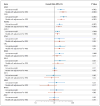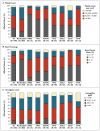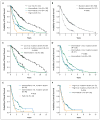Clinical effect of point mutations in myelodysplastic syndromes
- PMID: 21714648
- PMCID: PMC3159042
- DOI: 10.1056/NEJMoa1013343
Clinical effect of point mutations in myelodysplastic syndromes
Abstract
Background: Myelodysplastic syndromes are clinically heterogeneous disorders characterized by clonal hematopoiesis, impaired differentiation, peripheral-blood cytopenias, and a risk of progression to acute myeloid leukemia. Somatic mutations may influence the clinical phenotype but are not included in current prognostic scoring systems.
Methods: We used a combination of genomic approaches, including next-generation sequencing and mass spectrometry-based genotyping, to identify mutations in samples of bone marrow aspirate from 439 patients with myelodysplastic syndromes. We then examined whether the mutation status for each gene was associated with clinical variables, including specific cytopenias, the proportion of blasts, and overall survival.
Results: We identified somatic mutations in 18 genes, including two, ETV6 and GNAS, that have not been reported to be mutated in patients with myelodysplastic syndromes. A total of 51% of all patients had at least one point mutation, including 52% of the patients with normal cytogenetics. Mutations in RUNX1, TP53, and NRAS were most strongly associated with severe thrombocytopenia (P<0.001 for all comparisons) and an increased proportion of bone marrow blasts (P<0.006 for all comparisons). In a multivariable Cox regression model, the presence of mutations in five genes retained independent prognostic significance: TP53 (hazard ratio for death from any cause, 2.48; 95% confidence interval [CI], 1.60 to 3.84), EZH2 (hazard ratio, 2.13; 95% CI, 1.36 to 3.33), ETV6 (hazard ratio, 2.04; 95% CI, 1.08 to 3.86), RUNX1 (hazard ratio, 1.47; 95% CI, 1.01 to 2.15), and ASXL1 (hazard ratio, 1.38; 95% CI, 1.00 to 1.89).
Conclusions: Somatic point mutations are common in myelodysplastic syndromes and are associated with specific clinical features. Mutations in TP53, EZH2, ETV6, RUNX1, and ASXL1 are predictors of poor overall survival in patients with myelodysplastic syndromes, independently of established risk factors. (Funded by the National Institutes of Health and others.).
Figures




Comment in
-
The dawn of the molecular era of the myelodysplastic syndromes.N Engl J Med. 2011 Jun 30;364(26):2545-6. doi: 10.1056/NEJMe1102921. N Engl J Med. 2011. PMID: 21714652 No abstract available.
-
Point mutations in myelodysplastic syndromes.N Engl J Med. 2011 Sep 22;365(12):1154; author reply 155. doi: 10.1056/NEJMc1108665. N Engl J Med. 2011. PMID: 21992130 No abstract available.
-
Point mutations in myelodysplastic syndromes.N Engl J Med. 2011 Sep 22;365(12):1154-5; author reply 155. doi: 10.1056/NEJMc1108665. N Engl J Med. 2011. PMID: 21992131 No abstract available.
References
-
- Haase D, Germing U, Schanz J, et al. New insights into the prognostic impact of the karyotype in MDS and correlation with subtypes: evidence from a core data-set of 2124 patients. Blood. 2007;110:4385–95. - PubMed
-
- Greenberg P, Cox C, LeBeau MM, et al. International scoring system for evaluating prognosis in myelodysplastic syndromes. Blood. 1997;89:2079–88. [Erratum, Blood 1998;91:1100.] - PubMed
-
- Garcia-Manero G, Shan J, Faderl S, et al. A prognostic score for patients with lower risk myelodysplastic syndrome. Leukemia. 2008;22:538–43. - PubMed
Publication types
MeSH terms
Grants and funding
LinkOut - more resources
Full Text Sources
Other Literature Sources
Medical
Research Materials
Miscellaneous
